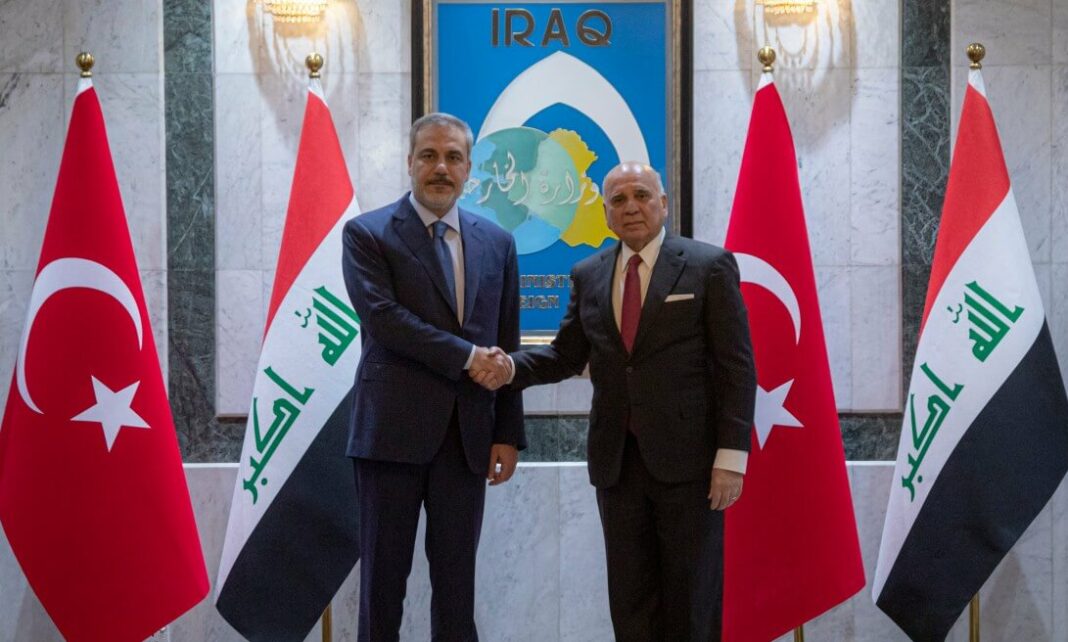Bünyamin Tekin
Turkey is planning a military operation in northern Iraq this summer targeting the Kurdistan Workers’ Party (PKK) to secure a strategic trade route linking the Gulf to Turkey via Iraq, according to Turkish and international media, citing sources familiar with the matter.
High-ranking Turkish officials including Foreign Minister Hakan Fidan and Defense Minister Yaşar Güler are visiting the Iraqi capital today for security consultations and talks on energy cooperation, the Turkish Foreign Ministry has announced. The visit is taking place ahead of a trip by Turkish President Recep Tayyip Erdoğan to Iraq, which is due to take place before the end of April.
Bakanımız @HakanFidan, Bağdat’ta Iraklı mevkidaşı Fuat Hüseyin ile bir araya geldi.
Ziyaret vesilesiyle, Irak Dışişleri Bakanlığı’nın ev sahipliğinde yapılan güvenlik toplantısına Milli Savunma Bakanı Yaşar Güler, Milli İstihbarat Teşkilatı Başkanı İbrahim Kalın ve İçişleri… pic.twitter.com/SUTxEJSGGo
— T.C. Dışişleri Bakanlığı (@TC_Disisleri) March 14, 2024
Turkey frequently carries out ground and air offensives on positions of the PKK — which has waged a decades-long war against the Turkish state — in northern Iraq.
It also has over the past 25 years operated several dozen military bases in northern Iraq in its war against the PKK.
This time Ankara aims to push the PKK south, sources familiar with the plans told Middle East Eye (MEE).
Turkish and Iraqi officials are also discussing the possibility of joint operations alongside Kurdistan Regional Government (KRG) forces to secure the area from Mosul to Duhok and the Turkish border town of Ovaköy as part of the Iraq Development Road project, MEE reported.
The Development Road seeks to establish a vital infrastructure corridor linking the Persian Gulf to Turkey via Iraq, though it is encountering obstacles such as financing, governance issues, security concerns and regional geopolitical tensions.
Over the past months the Turkish military has suffered significant losses from PKK attacks in the rugged terrain of northern Iraq, prompting a review of Turkish military strategies in the region. Continued attacks by the PKK have shown how difficult it is to operate in the harsh winter conditions of the northern Iraqi mountains, where drones and surveillance equipment often prove ineffective.
This new military operation will focus on the western parts of Iraq’s Kurdistan Region, close to areas controlled by the Kurdistan Democratic Party (KDP), an ally of Ankara. The aim is to cut off the PKK’s route to Mosul and secure the region for the construction of the 1,200 kilometer highway and railroad project. This ambitious project, which requires an estimated investment of $17 billion, is expected to create at least 100,000 jobs and generate annual revenue of $4 billion.
Turkish President Erdoğan is one of the main supporters of the Iraq Development Road project since he sees it as an important part of Turkey’s vision to connect to the Trans-Caspian International Transport Route (TITR), also called the Middle Corridor, a trade route from Southeast Asia and China to Europe via Kazakhstan, the Caspian Sea, Azerbaijan, Georgia and Turkey.
This project contrasts with the competing India-Middle East-Europe Economic Corridor (IMEC) initiative supported by Israel and the United Arab Emirates that bypasses Turkey.
Turkish Defense Minister Güler told Turkish media this week that Turkey must establish control 30 to 40 kilometers into Iraqi territory to ensure the success of the operation. Cooperation with Baghdad is sought, but complex problems have arisen from internal divisions in Iraq and Iran’s indirect influence on Iraqi decisions regarding the PKK.
Iranian influence in Iraq is a cause for concern for Ankara. It sees the presence of the PKK not only as a direct threat but also as a factor that could enable Tehran to exert pressure on Baghdad and indirectly on Turkey. This has led to speculation that Turkey’s planned military operation in northern Iraq could serve a dual purpose: fighting the PKK and countering Iran’s growing influence in the region.
Fatih Yurtsever, a former naval officer in the Turkish armed forces who writes in-depth analyses of Turkey’s geostrategic posture for Turkish Minute and uses a pseudonym for security reasons, provided insight into Turkey’s motivations and the wider regional implications.
He points to the interplay between Turkey’s military campaign and its geopolitical rivalry with Iran.
“Turkey’s upcoming campaign in northern Iraq is not only a counterterrorism operation but also a strategic move to counterbalance Iran’s influence in the region,” Yurtsever explains.
“The campaign in northern Iraq also emerges against the backdrop of a thawing in relations between Turkey and the United States.”
While cooling relations with Russia, Turkey is strategically realigning itself with the West through increased defense cooperation. This includes the ratification of Sweden’s NATO membership in exchange for F-16 jets from the US, participation in the European Sky Shield initiative and the potential purchase of Eurofighter Typhoon jets, representing a significant shift in Ankara’s geopolitical posture.
“With the pro-Iranian militia becoming more active in Iraq, the United States is very interested in Turkey and the Kurdistan Regional Government playing a more effective role in northern Iraq,” Yurtsever said.
He went on to talk about the importance of Iraq Development Road project. “This project is crucial not only for Turkey’s economic interests but also for its strategic aspirations,” he said. “Securing the border between Turkey and northern Iraq is crucial for the success of this initiative. However, Iran’s growing influence in Baghdad, exercised through proxies such as the PKK, poses a direct challenge to these plans.”
He predicts that Turkey’s upcoming military operations in northern Iraq could mark a significant shift in power dynamics in the region, potentially leading to a hardening of relations between Turkey and Iran. “The situation is headed towards a greater confrontation between Turkey and Iran as they vie for influence in Iraq and beyond,” Yurtsever said.

